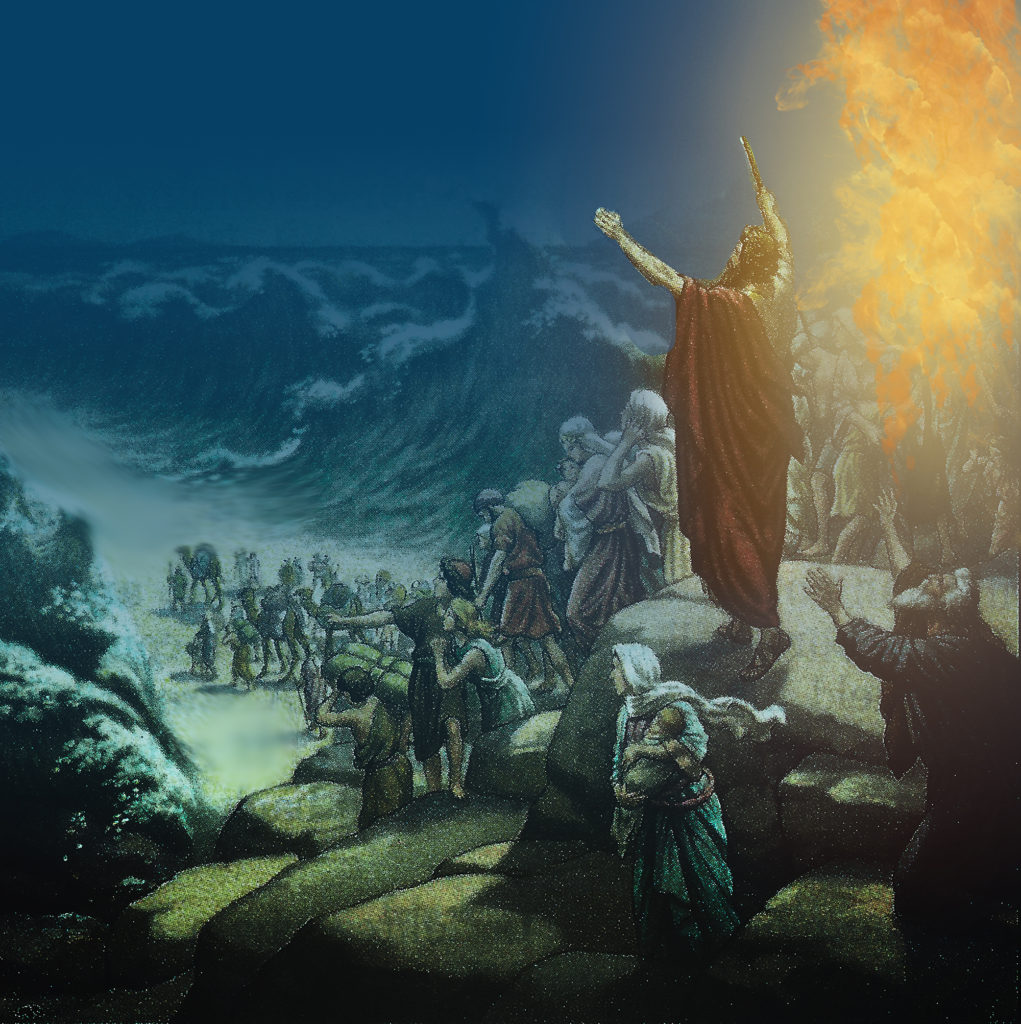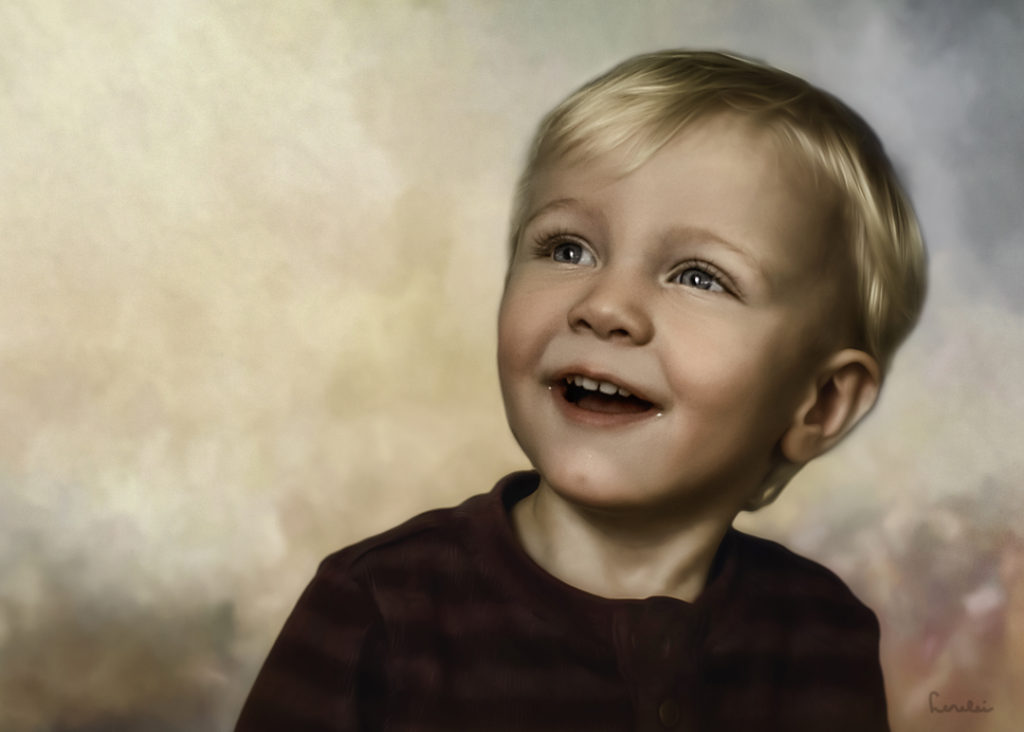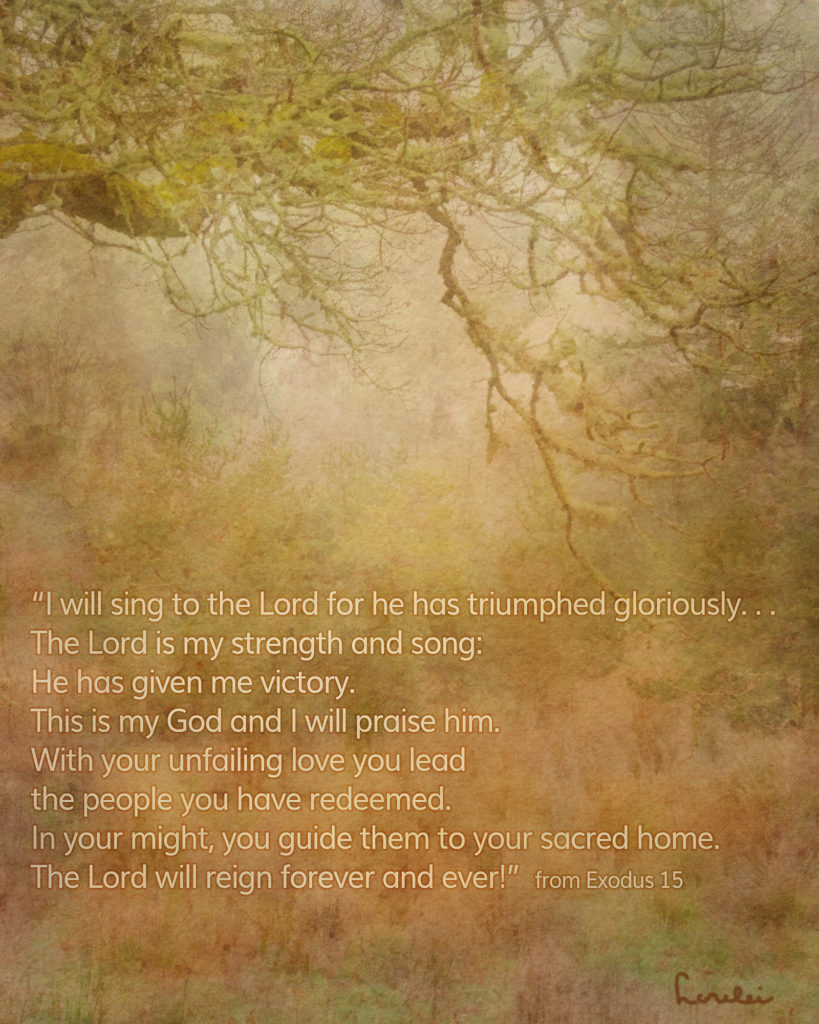 I can honestly say that I didn’t feel fear during the wildfires in our area several weeks ago. But when we returned to our little house still intact after our evacuation, I started noticing some symptoms of post-stress. It felt like the dense, dark smoke that kept us indoors for two weeks had crept into my brain. I couldn’t concentrate, I couldn’t think of names and words. My thoughts were scattered. For a few days, I worried that I had the beginnings of dementia. (Not kidding. And I think dear Husband was worried, too!). Then gradually my mental clarity returned- well, as much as I had originally, anyway! So I was greatly relieved. A few days ago I attended a ladies’ worship and teaching evening outdoors at someone’s home. At the close, a woman I didn’t know spoke briefly before praying for us. She talked about trauma and how the negative feelings associated with our trauma have the potential to work against us going forward if we allow ourselves to replay them over and over. She urged us instead, to set our minds on God’s deliverance every time thoughts of the wildfires enter our thinking. By redirecting our thoughts to God’s power and mercy, we are enabled to move forward in courage and peace. If we keep thinking about the fear, or the chaos, or the disruption we will keep suffering. But by redirecting our thoughts to God’s mighty intervention on our behalf by stopping the winds that spread the flames, we can move forward in faith and hope.
I can honestly say that I didn’t feel fear during the wildfires in our area several weeks ago. But when we returned to our little house still intact after our evacuation, I started noticing some symptoms of post-stress. It felt like the dense, dark smoke that kept us indoors for two weeks had crept into my brain. I couldn’t concentrate, I couldn’t think of names and words. My thoughts were scattered. For a few days, I worried that I had the beginnings of dementia. (Not kidding. And I think dear Husband was worried, too!). Then gradually my mental clarity returned- well, as much as I had originally, anyway! So I was greatly relieved. A few days ago I attended a ladies’ worship and teaching evening outdoors at someone’s home. At the close, a woman I didn’t know spoke briefly before praying for us. She talked about trauma and how the negative feelings associated with our trauma have the potential to work against us going forward if we allow ourselves to replay them over and over. She urged us instead, to set our minds on God’s deliverance every time thoughts of the wildfires enter our thinking. By redirecting our thoughts to God’s power and mercy, we are enabled to move forward in courage and peace. If we keep thinking about the fear, or the chaos, or the disruption we will keep suffering. But by redirecting our thoughts to God’s mighty intervention on our behalf by stopping the winds that spread the flames, we can move forward in faith and hope.
Her comments got me thinking about the response of God’s people after their traumatic experience of escaping slavery only to be caught between an advancing army and a sea. How did they deal with their trauma?
After God’s people, the people of Israel, marched bravely out of Egypt, they anticipated going straight to their ancestral home where their forebears had lived as nomads in the land of Israel. They knew the story of how a famine had driven their forefathers to resettle in Egypt where there was food. They had enjoyed the favor of the Egyptian government until new leadership took over. Then they were severely oppressed and turned into slaves without rights. After 400 years, the entire people group of millions followed Moses out of captivity. This bold escape was made possible by God’s miraculous dealings with the leader of Egypt. God’s hand of judgment had been heavy on the nation of Egypt, and in the end, they were eager to release the people of Israel in order to get relief from God’s plagues.
But immediately following their bold escape, Egyptian leadership decided they must be brought back. The king himself lead his entire mighty chariot cavalry in hot pursuit. Trapped against a large body of water, the people were convinced they were doomed. They were completely undone. Panicked. They blamed their leaders for the situation and regretted starting their journey.
 By a breathtaking miracle still retold thousands of years later, God sent a wind to separate the waters and made a dry path through the sea. Under cover of darkness, and with the cloud of God’s fire separating his people from the army, they escaped a second time from the Egyptians. But when the soldiers realized the people were escaping, they chased after them into the pathway in the sea. The gap began to close between the chariots and the slowest and weakest of the people. Just when it looked like the helpless escapees were at the mercy of the chariots, God made their chariots unable to be steered. In the chaos, the soldiers yelled, “Let’s get out of here! The Lord is fighting for Israel!” Then as the last of the escapees stepped foot on the far bank, God told Moses to raise his hand over the sea. I can picture the drama of that moment as the sun dawned on a new day. Moses with his hand raised, the waters roaring back into place covering the fleeing chariots, and the relief of the people as they realized they were finally free indeed. Not only did God rescue his people, but he also destroyed the power of their oppressors. Never again would they pursue his people.
By a breathtaking miracle still retold thousands of years later, God sent a wind to separate the waters and made a dry path through the sea. Under cover of darkness, and with the cloud of God’s fire separating his people from the army, they escaped a second time from the Egyptians. But when the soldiers realized the people were escaping, they chased after them into the pathway in the sea. The gap began to close between the chariots and the slowest and weakest of the people. Just when it looked like the helpless escapees were at the mercy of the chariots, God made their chariots unable to be steered. In the chaos, the soldiers yelled, “Let’s get out of here! The Lord is fighting for Israel!” Then as the last of the escapees stepped foot on the far bank, God told Moses to raise his hand over the sea. I can picture the drama of that moment as the sun dawned on a new day. Moses with his hand raised, the waters roaring back into place covering the fleeing chariots, and the relief of the people as they realized they were finally free indeed. Not only did God rescue his people, but he also destroyed the power of their oppressors. Never again would they pursue his people.
After God’s mighty deliverance, they didn’t complain about the tense close call. They sang about the Lord and his victory over their enemy. They didn’t dwell on their negative feelings before their deliverance. They praised God and repeated all he did to defeat their enemy. After their double deliverances, they burst into song and dance. They were focused on what God had done for them, not on their feelings during the trauma.
“I will sing to the Lord,
for he has triumphed gloriously;
he has hurled both horse and rider
into the sea.
The Lord is my strength and my song;
he has given me victory.
This is my God, and I will praise him.” Exodus 15:1-2
Then they looked forward to God’s future guidance and deliverance from the enemies they would face in the future as they took possession of their ancestral homeland.
 “With your unfailing love you lead the people you have redeemed.
“With your unfailing love you lead the people you have redeemed.
In your might, you guide them to your sacred home.
The peoples hear and tremble;
anguish grips those who live in Philistia.
You will bring them in and plant them on your own mountain—
the place, O Lord, reserved for your own dwelling,
the sanctuary, O Lord, that your hands have established.
The Lord will reign forever and ever!” Exodus 15:13-14, 17-18
The same should be true of us after a traumatic experience. Instead of letting our minds review our negative feelings of fear, distrust, blame, chaos, sadness, or pessimism, we should set our minds on God’s mighty deliverance. As we stand on the other side of a difficulty, we should direct our thoughts to the Lord’s strong help. We should praise him and repeat to ourselves and others how God brought us through our pain. We shouldn’t replay all the fear we felt. Instead, we should repeat the amazing power of God on our behalf and what he is going to do for us in the next challenge. We should rest in the fact that he has an unbeatable plan for us and that he alone is in charge.
We all have a headful of bad/painful/sad memories. What if every time one of them pushed to the surface we met it with gratitude that the Lord brought us through that experience? What if we didn’t replay the pain, but responded to that memory by saying, “Thank you, Lord, for bringing me through that. Here I stand today because you delivered me by your strong arm.” But what if I’m still in the middle of pain? I can still say, “Thank you, Lord, here I stand today because you brought me through yesterday by your kind mercy. And I know you’ll do it again today. And tomorrow.”
 “I will sing to the Lord for he has triumphed gloriously. . . The Lord is my strength and song: He has given me victory. This is my God and I will praise him.
“I will sing to the Lord for he has triumphed gloriously. . . The Lord is my strength and song: He has given me victory. This is my God and I will praise him.
With your unfailing love you lead the people you have redeemed.
In your might, you guide them to your sacred home.
The Lord will reign forever and ever!” from Exodus 15
Red Sea image from my mother’s teaching materials I have kept for all these years. Scripture Press July 1942 (I altered to reflect the night escape)